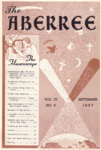Volume 4, Issue 5, page 6
An Analysis of Synergetics - - Pal
v~ftooeltfs Dete'
N PART I, I discussed some aspects or
Synergetics as I saw it, as related to
Humanism. But Synergetics is several
years old and has developed in a multi-ordinal way. There are several other
aspects it can be viewed from, some
"nicer" than others. A subject is not
really known until viewed from some of
these other aspects.
The one I choose to expound here is
that of "Positive Synergetic5 ". It must
be understood that I am starting from a
definite premise that with time, any idea
tends to become crystalized, to drop some
of its qualifications, or to become more
inclusive and less restrained. This tendency is well dealt with by Norbert Wiener in "The Human Use of Human Beings" as
an increase in entropy of a communication
system, and also in "The Measure of Man"
by Joseph Wood Krutch. To move from theory to practice, I shall take one of the
main ideas in Synergetics, and show its
implications as they are manifested with
the passage of time.
We choose the "C.E.D.A." for this exposition, as it can be shown to be the
germ of "Positive Synergetics". In CEDA,
we are told to Consider, Evaluate, Decide
and Act. This sequence is necessary for
any action, tho some steps may be carried
out below the threshold of awareness.
Korzybski tells us that first decisions
are due to "thalamic" action, and we
should take a brief pause to give the
"cortex" time to operate. Second sight is
more reasonable than first sight. In fact,
we were told in a recent CHANGE that in
using CEDA, one is able to make "accurate
decisions in less time". It is how accurate that I question here.
Note, too, that there is no provision
for correction by feedback. In fact, there
is a universal human tendency to defend
one's actions by justifying them. This,
Synergetics attempts to deal with by
"v al uework" . Now, Mr. Krutch , mentioned
above, devotes a chapter to values and
comes up with the frightening conclusion
that there is no scientific basis for
value decisions. The best we can get is a
vote as to what the majority think is
right. Values based on survival as a test
lead to a circular logic pattern ending
with the view that whatever survives has
value. And biologists have stated that
the cockroach has survived longer than
most other creatures unchanged. Hence,
the cockroach has greater value than humanity. This, I cannot accept.
To repeat, values have either a metaphysical function or a popular function,
a
t II By RICHARD W. LUNDBERG
Roach 7T(1Itht9'
but not a scientific one. In the populace, Jung tells us, there are two main
types of persons -- the extrovert and the
introvert. The extrovert prefers to look
outward to other persons. He looks to society to determine his values. But there
is not a "society" but many sub


